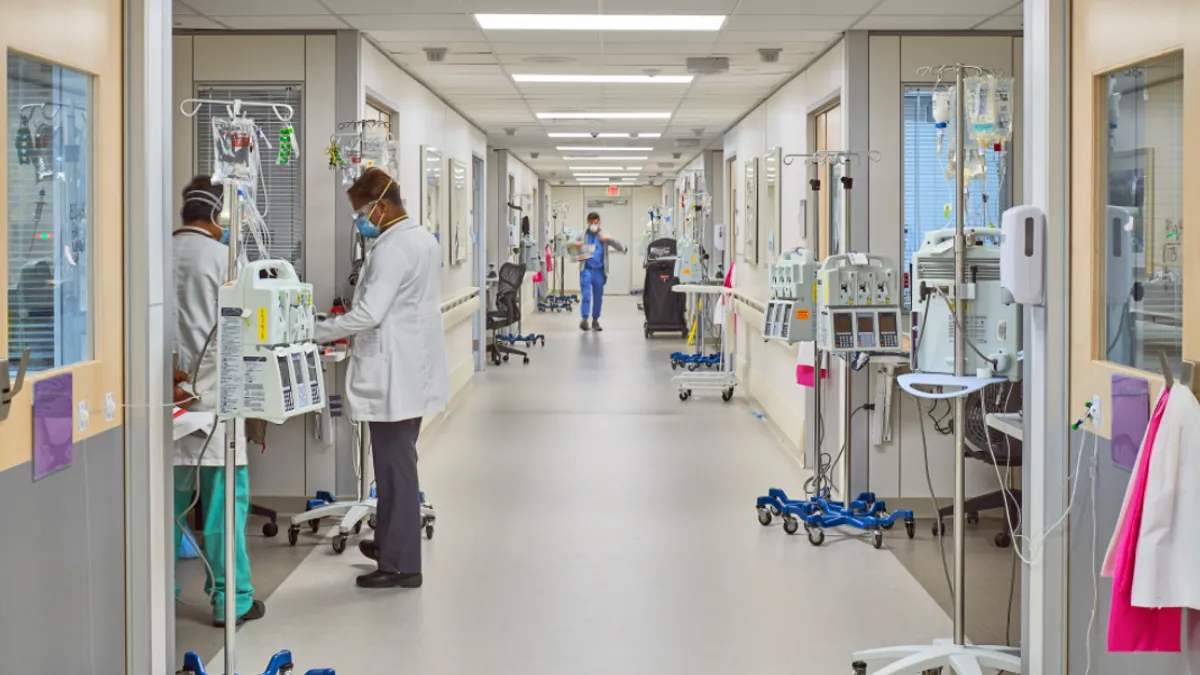Dive Brief:
- U.S. surgical procedure volumes rebounded quickly after the initial COVID-19 shutdown in March and April 2020, pointing to the ability of health systems to self-regulate and function at pre-pandemic capacity, according to a research paper published Wednesday in JAMA Network Open.
- The study findings are in line with the experiences of procedure-dependent medtech companies such as NuVasive, which saw sales rebound faster than expected in May and June 2020 and beat analyst expectations.
- That experience led analysts to expect a similarly swift recovery from the delta variant wave. However, confounding factors such as the healthcare staffing shortages caused the headwind to drag on — and, now, rapidly increasing inpatient volumes are leading hospitals to once again delay procedures.
Dive Insight:
The JAMA paper looks at more than 13 million U.S. surgical procedures performed from the start of 2019 to Jan. 30, 2021. When groups including the Centers for Medicare and Medicaid Services recommended postponing nonessential surgeries in March 2020, the total surgical procedure volume immediately fell 48%. That was when medtech companies began warning the pandemic would hit sales.
However, the fall in procedure volumes was temporary. The study found surgical volumes returned to 2019 rates, except in otolaryngology, and remained at that level even as COVID-19 surged again in the fall and winter. Arden Morris, a Stanford University School of Medicine professor of surgery and one of the authors on the paper, shared his take on the finding.
"This tells us that we learned something, institutionally and nationally, about how to provide care during a time of crisis. Even as supply lines were compromised; as we were trying to preserve PPE; and, most importantly, as we limited transmission of this highly transmissible virus, we managed to provide care at essentially the same rates as usual," Morris said in a statement.
Medtech companies expressed similar views about the resilience of healthcare last year, for example when Johnson & Johnson CFO Joseph Wolk cited the fact the health system is "much better positioned than when the virus first appeared" arguing that a new COVID-19 wave "should not have the same level of global impact that's been experienced in the last four months."
However, the delta wave did affect surgeries, both in the U.S. and overseas, and this time around the recovery is slower. Medtronic, one of the latest companies to comment on volumes, said it saw "some improvement" in November but warned factors such as the "critical staffing shortage in hospitals around the world" is slowing the recovery.
Since then, the pressures on hospitals have intensified. Cleveland Clinic is postponing nonessential surgeries requiring a hospital bed at Ohio hospitals from Dec. 8 to Dec. 17 to make additional beds available. New York is affected, too, with Democratic Gov. Kathy Hochul signing an executive order to postpone non-essential hospital surgeries and multiple hospitals subsequently stopping procedures.
As of Nov. 29, New Jersey had no plans to stop elective procedures but, with omicron cases doubling every two to three days in the U.K., which sequences more samples than most countries, the new variant could cause a steep wave that forces a change in policy. Analysts at credit agency Fitch Ratings called omicron an "added, but manageable risk" for not-for-profit hospital operations.













